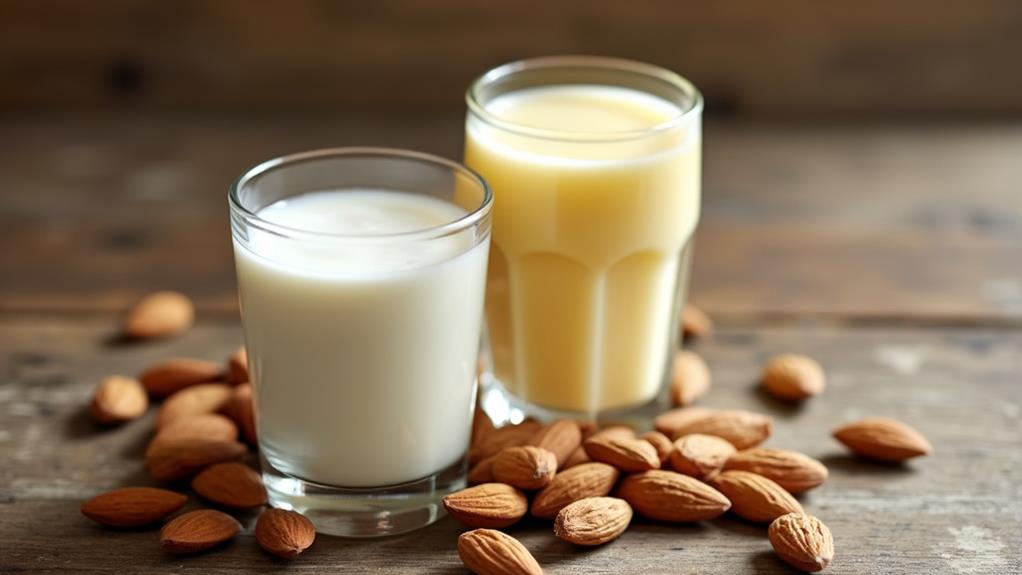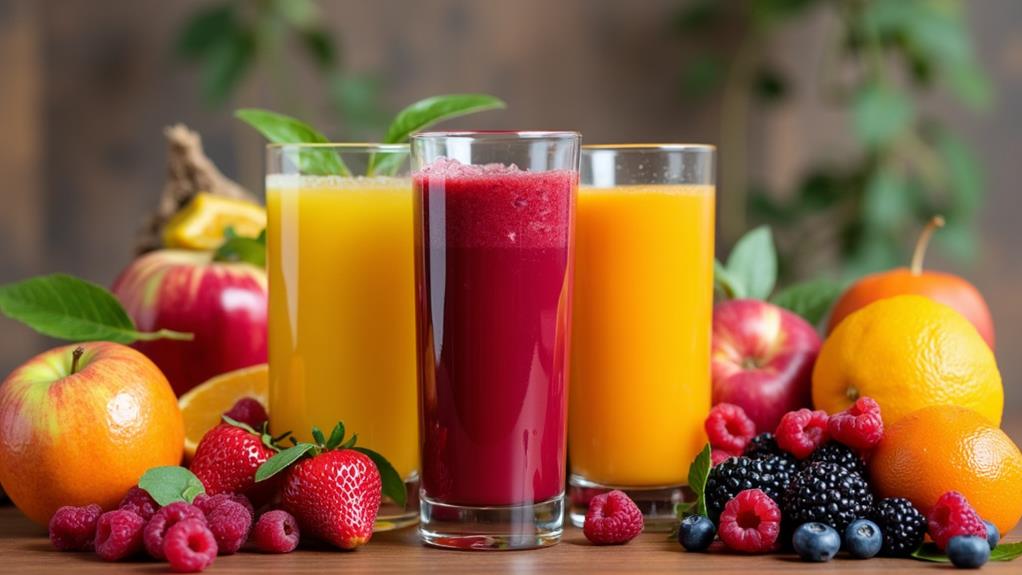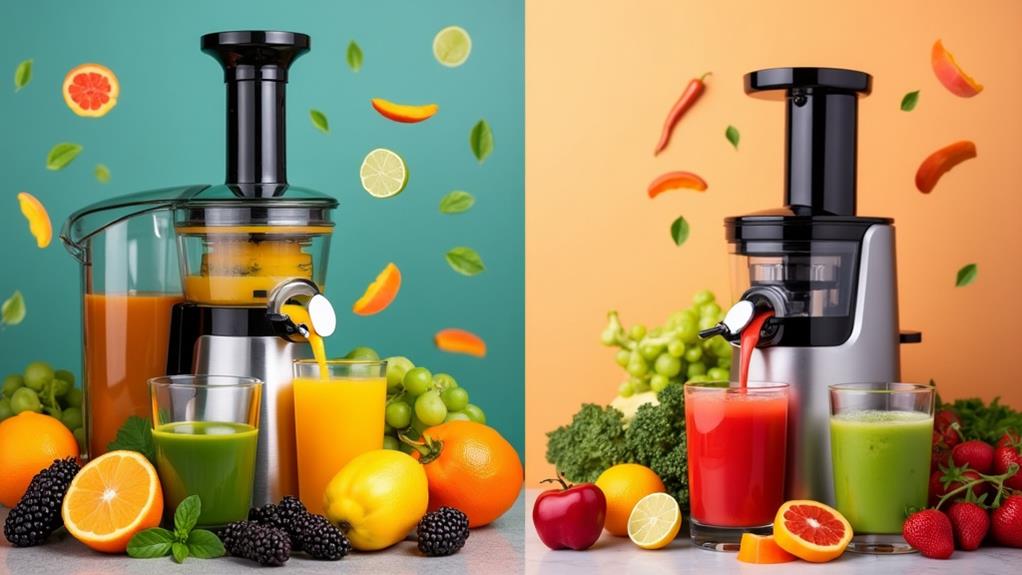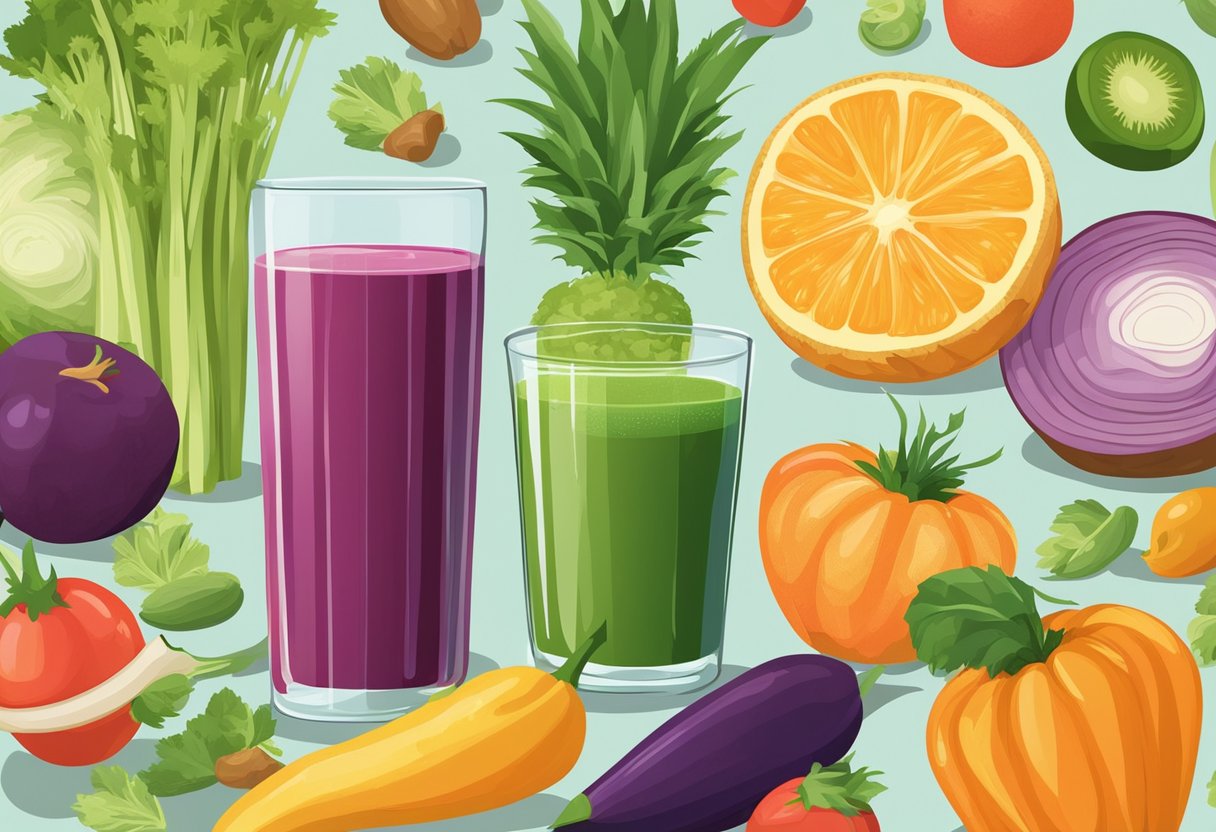Jicama Juice: Sweet, Crunchy, and High in Vitamin C
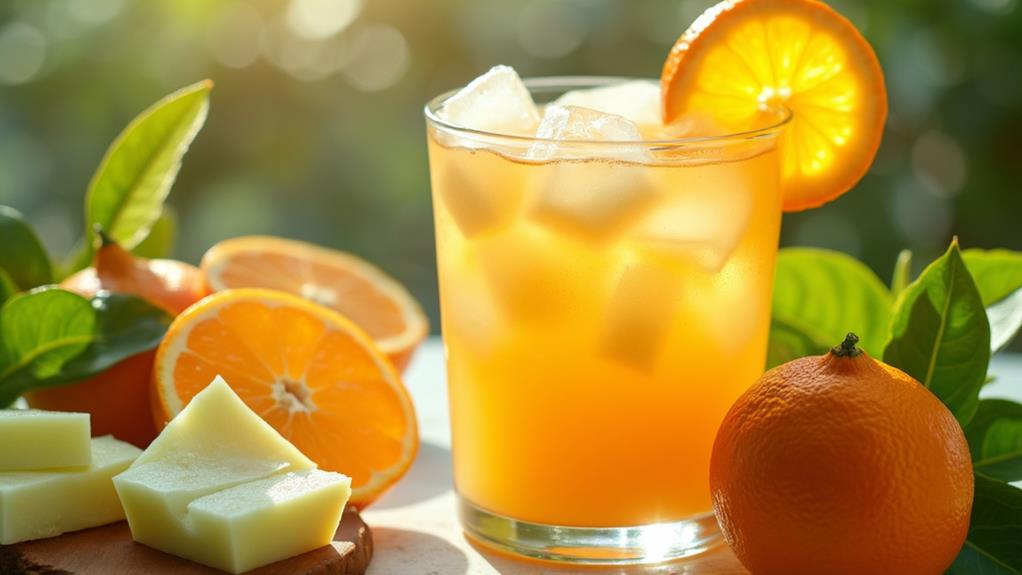
Jicama juice is a delightful surprise, offering a sweet and crunchy taste while being incredibly nutritious. You'll love that it's low in calories yet high in dietary fiber, which helps keep you full longer. Significantly, it's rich in vitamin C, providing 44% of your daily intake per cup, enhancing your immune system and skin health. Packed with antioxidants, it also aids in collagen synthesis and iron absorption. Its high water and inulin content support digestive health, making it a fantastic hydration source. Curious about its other exceptional benefits and uses? There's more to uncover just below.
Nutritional Highlights of Jicama
Jicama packs a nutritional punch that's hard to ignore. If you're looking for a snack that's both invigorating and healthy, jicama might just be your perfect match. This root vegetable is low in calories, with only about 38 calories per 100 grams, making it an excellent choice for weight management. You'll appreciate how it promotes fullness, thanks to the impressive 6.4 grams of dietary fiber per cup. This fiber not only aids digestion but also helps keep your blood sugar levels stable due to its low glycemic index.
When it comes to heart health, jicama doesn't disappoint. It's a good source of potassium, offering 195 mg per cup, which plays an essential role in regulating blood pressure and supporting your heart. Plus, jicama is rich in vitamin C, providing 26.3 mg per cup, which bolsters your immune function and keeps you feeling your best.
Incorporating jicama into your diet can be a delicious and nutritious choice. Regardless of whether you eat it raw, add it to salads, or blend it into juices, you'll enjoy its health benefits and delightful crunch. So, go ahead and give jicama a try!
Vitamin C Benefits
Beyond its fiber and potassium content, this versatile root vegetable stands out for its vitamin C concentration. Jicama juice is a powerhouse, delivering about 44% of your recommended daily vitamin C in just one cup. This nutrient is essential for a multitude of health benefits that you might not even realize you're getting when sipping on jicama juice.
To begin with, vitamin C plays a significant role in collagen synthesis, which is important for maintaining lively skin and aiding in wound healing. Next, as a potent antioxidant, it helps neutralize free radicals, thereby combating oxidative stress and potentially lowering your risk of chronic diseases. Moreover, regular intake of vitamin C-rich foods like jicama can bolster your immune function, keeping your body resilient against infections.
Additionally, jicama's vitamin C content improves iron absorption, which is particularly beneficial in preventing anemia and supporting general health. When you make jicama juice a part of your diet, you're not just enjoying a rejuvenating drink; you're also fortifying your body with a key nutrient that supports multiple aspects of your wellbeing. So, raise a glass to jicama juice and its incredible vitamin C benefits!
Digestive Health Support
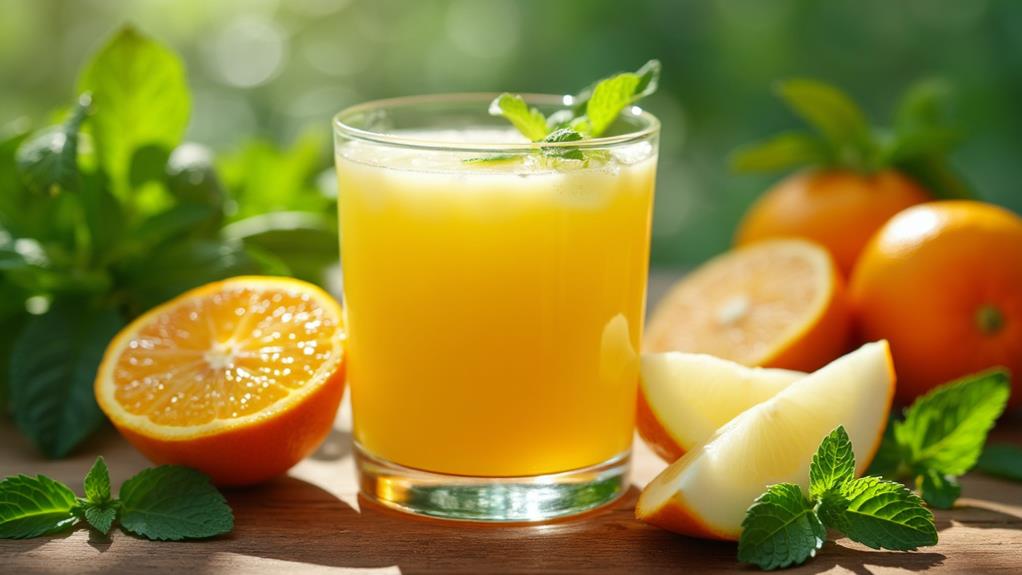
In relation to digestive health, one cup of jicama juice offers an impressive 6.4 grams of dietary fiber. This fiber plays an essential role in promoting digestive regularity, ensuring smoother bowel movements. Jicama's high water content, about 85%, further supports your digestion by easing constipation and meeting daily fluid needs. When you drink jicama juice, you're not just hydrating but also enhancing your digestive system's efficiency.
Moreover, jicama contains inulin, a type of prebiotic fiber. Inulin increases bowel movement frequency by 31%, supporting the growth of healthy gut bacteria and improving gut health. A healthier gut means better digestion and a reduced risk of digestive discomfort. The prebiotic fiber in jicama helps bulk up stool, making it easier to pass and keeping your digestive tract in excellent shape.
Additionally, the antioxidants and vitamin C in jicama juice contribute to reducing inflammation in the digestive tract. By doing so, they help manage the inflammatory response, promoting comprehensive digestive wellness. So, if you're looking to support your digestive health naturally, incorporating jicama juice into your diet could be a revitalizing and effective choice.
Weight Loss Advantages
While jicama juice improves your digestive health, it also offers significant weight loss advantages. Initially, it's a low-calorie beverage, with just 38 calories per 100 grams, making it an ideal choice for weight loss diets. This means you can enjoy its sweet, crunchy taste without worrying about excess calories. Furthermore, jicama's high fiber content—6.4 grams per cup—plays a vital role in appetite control. The fiber promotes satiety, helping you feel full longer and reducing the urge to snack unnecessarily.
Moreover, jicama juice is packed with about 85% water, contributing to your hydration needs. Staying hydrated is fundamental for general health and can aid in weight management by curbing cravings. Here's a quick breakdown of how jicama juice supports weight loss:
- Low-calorie and hydrating: Enjoy without guilt while maintaining hydration.
- High in fiber: Helps control appetite and promotes satiety.
- Contains prebiotic fiber: Improves insulin sensitivity, enhancing weight loss efforts.
Regular consumption of jicama juice supports digestive health by promoting regular bowel movements, thanks to its fiber content. This not only aids in maintaining a healthy weight but also guarantees you get a good dose of vitamin C, further supporting your general well-being.
Culinary Uses of Jicama

Jicama's versatility makes it a star in the kitchen, offering a crunchy texture and mildly sweet flavor that improves many dishes. You can enjoy jicama raw in salads, where its crispness complements other ingredients beautifully. It's a perfect supplement to fruit salads, pairing well with lime juice for that extra zest. High in vitamin C and fiber, jicama not only adds nutritional value but also supports a healthy lifestyle.
When aiming for weight loss, jicama is an excellent choice. Its low-calorie content makes it a smart substitute for starchy ingredients. Consider using it in dips, soups, and stir-fries to keep things light yet satisfying. Popular recipes like jicama tacos offer a fresh and crunchy alternative to traditional shells, while a jicama salad with mango and lime adds a tropical twist to your meal repertoire.
For a healthy snack, transform jicama into chips. These provide a satisfying crunch without the guilt, thanks to their low-calorie and high-fiber content. With its unique texture and flavor, jicama can easily become a staple in your kitchen, offering endless possibilities for creative and nutritious meals.
Preparing Jicama Juice
Juicing jicama starts with selecting a fresh, firm root that'll give you the best flavor and nutrients. Begin by thoroughly washing your jicama to remove any dirt. Next, peel off the thick brown skin using a knife or vegetable peeler. This step is essential to guarantee the juice's invigorating taste isn't compromised by the outer layer. After peeling, cut the jicama into small cubes or strips. This makes it easier to blend or juice, leading to a more efficient extraction process.
To prepare the juice, use a juicer or blender. If you're using a blender, add a little water to help with blending. This will guarantee a smooth, flavorful juice that's both invigorating and packed with nutrients. Here are some tips to improve your jicama juice experience:
- Flavor Enhancement: Mix with lime juice or a pinch of chili powder.
- Nutrient Rich: Jicama juice provides about 26.3 mg of vitamin C per cup.
- Invigorating Twist: Enjoy its naturally sweet and crunchy taste.
Storing Jicama Properly
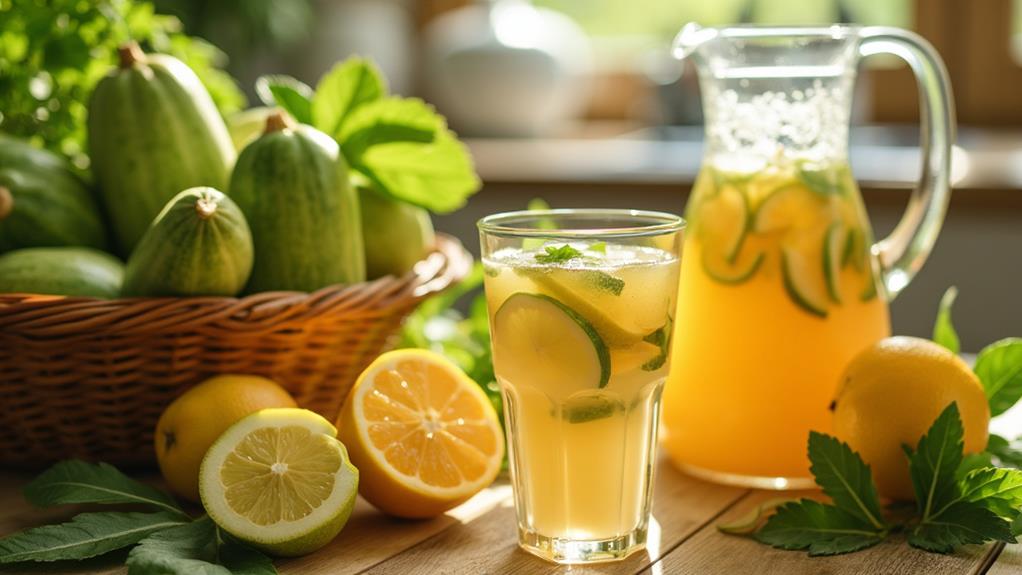
After crafting a delicious jicama juice, you'll want to make certain your leftover jicama stays fresh and flavorful. Storing jicama properly is key to maintaining its crunchiness and preventing spoilage. If you have a whole, uncut jicama, keep it in a cool, dry pantry. This method preserves its freshness and flavor for 2-3 weeks. However, if you bought jicama from a chilled section, placing it in the refrigerator can help prolong its shelf life.
Once you've cut the jicama, you'll need to take extra steps to make certain it doesn't dry out or spoil. Wrap the cut pieces tightly in plastic and store them in your refrigerator. This will help them last up to a week. If you've peeled the jicama, submerge it in water and store it in an airtight container. This technique keeps it crisp and fresh for up to three days.
Environmental Impact
A significant advantage of choosing jicama is its minimal environmental impact. This sustainable crop thrives in diverse climates and uses less water than many other root vegetables. Its eco-friendly nature makes it a smart choice for cultivation. When you opt for jicama, you're supporting a crop with a low carbon footprint, particularly when it's sourced locally. This local production reduces transportation emissions, supports community agriculture, and minimizes its environmental impact.
Consider these benefits:
- Sustainable and Eco-Friendly: Jicama requires less water, making it a sustainable choice. Its ability to grow in diverse climates improves its eco-friendly appeal.
- Biodiversity Promotion: Cultivating jicama promotes biodiversity. It can grow alongside other crops, enriching the ecosystem and offering a varied diet.
- Local Food Production: You can easily plant jicama in community gardens, fostering local food production and connecting with sustainable practices.
As a nutrient-dense food, jicama supports sustainable eating. It allows you to enjoy health benefits while minimizing environmental harm. By choosing jicama, you contribute to a more sustainable and eco-friendly world, benefiting both the environment and your diet.
Comparing Jicama to Other Vegetables
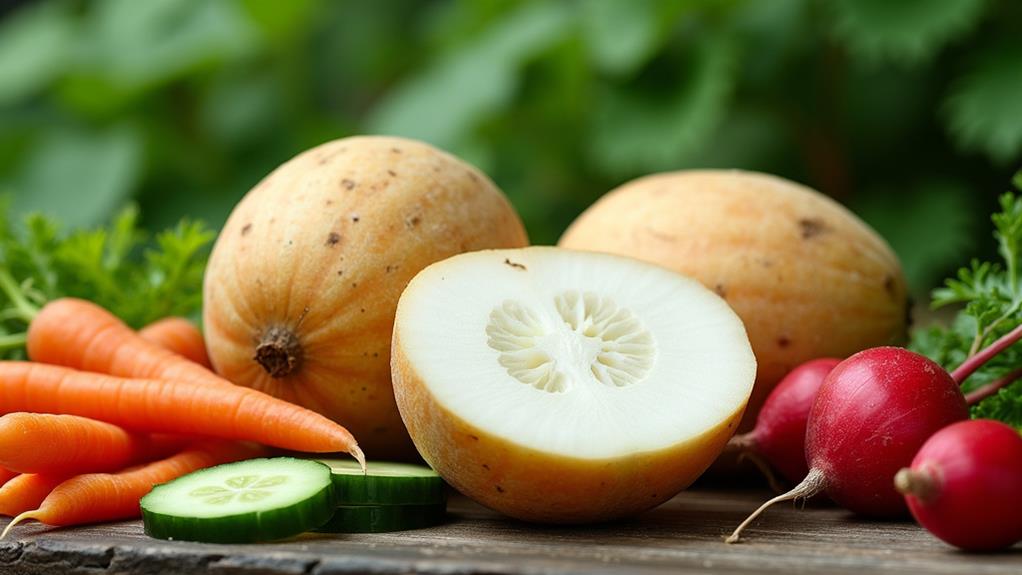
Beyond its environmental benefits, jicama stands out when compared to other vegetables regarding nutritional value and versatility. If you're looking for a low-calorie option, jicama is a fantastic choice, with only 38 calories per 100g. This makes it a better option than carrots and potatoes for those mindful of calorie intake. Its crunchy texture and sweet flavor make it a delightful enhancement to salads, slaws, or even as a snack.
Jicama's fiber content is impressive, with a 130g serving offering 6.4g of fiber, surpassing cucumbers and supporting your digestive health. It's not just any fiber either—jicama is rich in inulin, a prebiotic fiber that promotes gut health by nourishing beneficial gut bacteria. This can aid in weight management and improve overall digestive health.
Moreover, jicama excels in vitamin C content, delivering 44% of your recommended daily intake per cup. This increase in vitamin C helps strengthen your immune function and supports skin health. Compared to many common vegetables, jicama's high vitamin C content and prebiotic fiber make it a unique and beneficial enhancement to your diet, offering both health benefits and culinary versatility.
Precautions and Safety Tips
When enjoying jicama, it's vital to know that only the flesh is safe to eat, as the skin, leaves, and seeds contain toxic compounds. To safely incorporate jicama into your diet, follow these precautions and safety tips. Initially, wash jicama thoroughly to remove any contaminants before peeling and juicing it. This step guarantees you avoid ingesting harmful substances.
Allergic reactions, although rare, can occur, especially if you're sensitive to legumes. Symptoms might include skin irritation or throat itching, so be mindful of any adverse reactions. If you notice anything unusual, consult a healthcare provider promptly.
Given jicama's high fiber content, consuming it in moderation is vital to prevent digestive discomfort. Overindulgence can lead to bloating or gas, which isn't pleasant. Here's a quick guide to guarantee safe consumption:
- Wash thoroughly: Clean jicama well to eliminate dirt and chemicals.
- Moderation is key: Avoid digestive issues by consuming reasonable amounts.
- Consult a healthcare provider: Seek advice if you have specific health conditions or dietary concerns.

